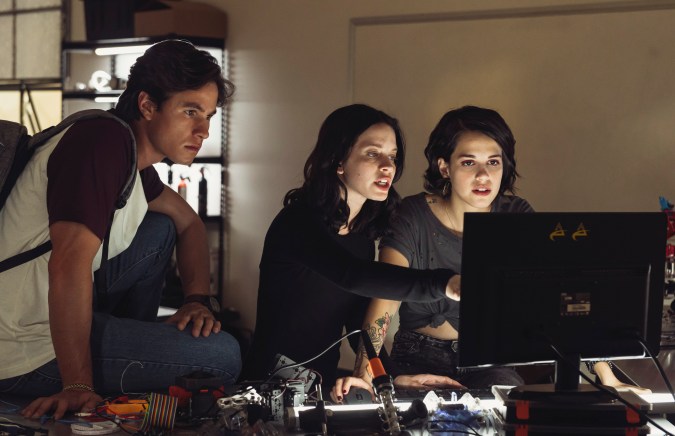In Control Z, Netflix Mexico’s new series, the production giant understands the changing attitudes of its audience. Like Casa de las flores and Luis Miguel: La Serie, the show continues down an exploration of the vulnerabilities of well-heeled chilangos in a Gossip Girl meets Gen Z milieu, where the dramas of stereotypical high school students – that is, characters of a stereotypically U.S. variety — unfold over text message and social media, with a modern social justice twist.
The whodunnit plot kicks off during a school assembly about the overuse of cell phones. Suddenly, a video montage of documents informing the entire school that a popular girl, Isabela, is trans, takes over the screen. Sofia (Ana Valeria Becerril), the school weirdo, a bona fide tech-nerd who keeps a close eye on even the most minute of school happenings, is selected to find the culprit who leaked the documents revealing Isabela’s gender transition. Sofia emerges as the show’s main character, through which viewers get backdoor access to the school’s chaotic day to day. The new guy (Michael Ronda), a son of a famous soccer player who unexpectedly befriends Sofia; an artsy kid (Luis Curiel), who’s victim to particularly cruel bullying; and the bully (Patricio Gallardo) himself, who might be hiding information about his own sexual identity, round out the cast. Like any good telenovela, the characters are as full of secrets as the show is full of clichés.
What’s interesting about the new series is the awareness that Netflix displays in understanding the changing attitudes of its audience, who appear interested in ushering in a degree of change into social environments without actually reimagining a new world. The rampant consumerism, separation of the social classes and seeming unawareness of racial dynamics remain unchecked by the show’s characters as well the series itself.

Viewers might be relieved to know that Netflix’s commitment to exploring sexual orientation isn’t totally superficial, though. In fact, for Zion Moreno, the actress who plays Isabela, these issues are personal. Moreno, who grew up in El Paso and is Mexican-American, is trans, making her one of the first trans protagonists in Mexican television. At 27 years old, she was recently cast in HBO Max’s reboot of Gossip Girl, slated for release next year.
Gender politics unravel within bounds. In one poignant scene, Isabela retreats to the women’s bathroom, moments after she’s been outed. Holding back tears, she encounters one of the school’s social outcasts, an out lesbian who tries to extend a sense of solidarity to Isabela. “Spare me your LGBT lectures!” Isabela snaps, “We’re not the same.” Moments like these provide depth and nuance to what would otherwise be a boilerplate high school drama.
The adults function as incompetent foils to the slick kids who seem to get their way as much in real life as they do online. Of note is the school’s incompetent principal, who seems as unable to reign over his student body with any authority as he is totally out of touch with what’s important to today’s youth. In one memorable scene, he awkwardly and ignorantly fumbles over saying “LGBT,” giving the impression he’s never said it before. Equally tone deaf is his chismosa secretary, who declares her love for issues youth are facing “today.” Have these adults never heard of the Internet?
The teenagers of Control Z busily import on trend social causes along with the latest iPhone and designer apparel – “do you know how much this bag costs?” scoffs one character about her purse while her place in the school’s social hierarchy unravels. As is generally the case, designer logos take up a good amount of airtime in Control Z, whose characters gallivant with ease in puffy vests, gold jewelry and foreign cars – the uniform for Mexico’s U.S.-obsessed upper class with access to the United States. The show is littered with English-language words, as familiarity with English is as much a marker of taste and class as any logo. Students even text each other in English. When one of the main characters comes home from school to a disheveled and abandoned house, he finds a note from his corrupt politician-father in English and a not so short stack of hundred-dollar bills.
For a show that takes place entirely in a foreign country, access to the U.S. is the universal sign of success. The cast is entirely white and conversations about race are nonexistent. Control Z signals a shift in attitudes within Mexico’s upper class, but is also indicative of its limits.
Control Z is now streaming on Netflix




